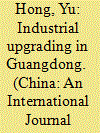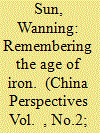| Srl | Item |
| 1 |
ID:
130585


|
|
|
|
|
| Publication |
2014.
|
| Summary/Abstract |
Guangdong has played an important role and been in the vanguard of China's economic reforms and opening up since 1978. Industrial production in Guangdong has expanded rapidly, which in turn led to rapid growth in the economy. Fast industrialisation followed and Guangdong has since developed to become the industrial powerhouse for China and the world. Nevertheless, over the recent years, Guangdong has been facing both internal and external pressures to increase its industrial competitiveness and undertake industrial upgrading. Industrial upgrading has been the focal point of government policies since the early 2000s. However, the results from industrial upgrading are not too encouraging and problematic industrial policies have thwarted the government's aspirations for industrial upgrading rather than speeding up the process. In addition, Guangdong's aspirations to move up the value chain and achieve industrial upgrading are met with various obstacles and challenges. Guangdong's industrial development is still mainly driven by the low-end and low value-added manufacturing industry, and the status quo of Guangdong as the world's low-end assembly and processing base remains unchanged.
|
|
|
|
|
|
|
|
|
|
|
|
|
|
|
|
| 2 |
ID:
139303


|
|
|
|
|
| Summary/Abstract |
Over the past few years we have witnessed a minor cultural phenomenon in China, with the production and enthusiastic reception nationwide of several television dramas about Chinese workers in the socialist decades. Set in the industrial plants of Liaoning in China’s northeast, once the industrial powerhouse of the socialist nation, these drama series centre on the dramatic transformation in workers’ experiences from 1949 to the start of economic reforms. In this paper I explore these series, asking: what does the smallscale production but enthusiastic reception of this genre tell us about the contemporary cultural politics of class? This paper addresses this question by (1) highlighting the key aspects of workers’ experiences with socialism as depicted in these television narratives; (2) considering the creative agenda of Gao Mantang, the script writer of the most successful industrial-themed television series; and (3) identifying some crucial ways in which the subjectivity of workers and other social groups in contemporary Chinese society intersect to shape the cultural politics of class. This discussion shows that television dramas have indeed become the basis of a widely accessible public forum that helps forge a renewed appreciation of the moral integrity of China’s working class, vent a widespread sense of injustice, and foster a certain degree of solidarity between workers and other social classes. At the same time, while television dramas about workers may hold significant potential for mobilising public support for the working class and advocating workers’ interests, this discussion also suggests that so far this potential has not been fully exploited
|
|
|
|
|
|
|
|
|
|
|
|
|
|
|
|